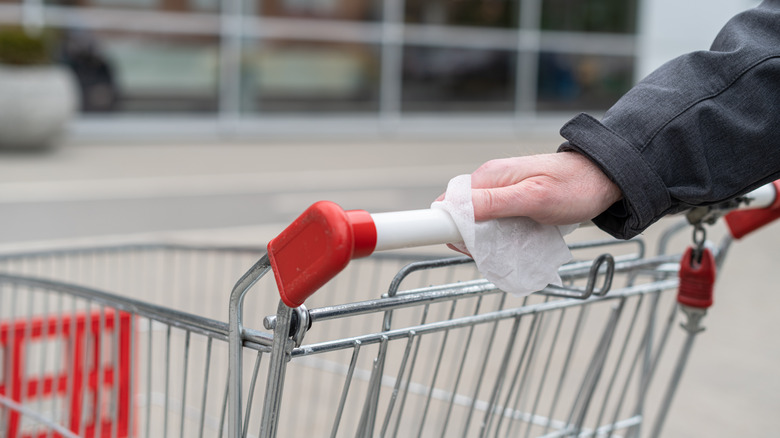How Dirty Are Shopping Carts?
A survey examining U.S. consumer behavior in 2019 revealed that 97% of Americans go shopping once a month or more for their groceries, with nearly 40% of respondents taking multiple grocery trips per week (via Statista). With so many Americans running frequently to the store, a shopping cart is no doubt required in order to adequately load up. With the same carts passing through so many hands each day, just how sanitary are shopping carts?
A 2012 study conducted by University of Arizona researchers discovered the presence of a host of bacteria on the handles and seats of 85 shopping carts in different cities across the country. A total of 72% of carts contained coliform bacteria, a potentially harmful bacteria that can cause vomiting, fever, and diarrhea (via Michigan Department of Health & Human Services). E.Coli, specifically, was found on 18 out of 35 of the carts. In comparison to other commonly touched surfaces, the study showed that the amount of bacteria and fecal matter on shopping carts surpasses that of public telephones and escalators (via ABC News), therefore demonstrating the possible risks of placing children in shopping carts.
Knowing this, are grocery stores now implementing measures to protect the health and safety of customers. More importantly, what can we do to best protect ourselves?
How to protect yourself from shopping cart germs
In recent years, some grocery stores have begun offering disinfectant wipes and hand sanitizer stations at store entrances. However, it can't be guaranteed that everyone is using them. Aside from bacteria, experts at Utah State University also emphasize the increased risk for viral infection during flu season. "When you think about the number of times a cart is touched in eight hours, there are all kinds of things that can get passed around," said Utah State University Extension Grand County director Michael Johnson. "Especially when you consider the number of people who catch colds or the flu each year, yet still have to go out and shop — if for no other reason than to buy medicine or comfort foods."
The Centers for Disease Control and Prevention (CDC) states that the flu virus can continue to live and infect individuals within 8 hours of having been exposed to a contaminated surface. For this reason, it's important to take extra precautions to minimize the chances of transmission, even if grocery store locations are implementing regular cart cleanings.
Johnson notes that it can be helpful to have your own sanitary wipes on hand. "You can be proactive by cleaning the handles and even the seats on shopping carts with disinfecting wipes," he said. "If you touch potentially contaminated surfaces, don't touch your face until after thoroughly washing your hands."


